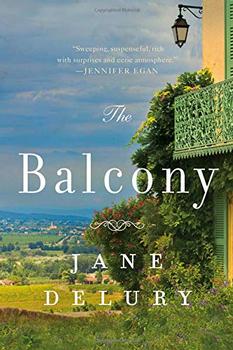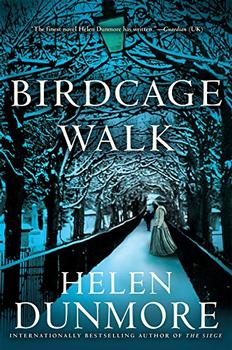Summary | Excerpt | Reviews | Beyond the book | Read-Alikes | Genres & Themes | Author Bio

Landscape can be a writer's best friend. Whether it's the mountains of England's lake district inspiring Wordsworth's philosophical musings or the haunted forest of L. Frank Baum frightening Dorothy on her way to the Emerald City, writers have often relied on the land to convey feeling – and sometimes, a bit more. Take, for instance, Andrew Michael Hurley's debut novel, The Loney. The landscape is not just one element in his darkly imagined modern gothic tale – it's the element, the lead character in a drama whose human characters shrink beside the awesome forces of wind, water, and woods.
The title refers to the local designation given to a stretch of land along the north Lancashire coastline in England. Its unpredictable and savage tides and its dark, storm-infused skies not only set the mood for Hurley's tale but also dominate the story:
Dull and featureless it may have looked, but the Loney was a dangerous place. A wild and useless length of English coastline. A dead mouth of a bay that filled and emptied twice a day and made Coldbarrow – a desolate spit of land a mile off the coast – into an island.
Not surprisingly, the inhabitants of such a godforsaken stretch of land are a darkly mysterious folk, not particularly friendly and certainly not desirous of visits by outsiders – especially the annual religious pilgrimage of the teenaged narrator and his family. The stage is set early in the novel for a culture conflict between the uber-religious pilgrims from London (including two other couples and a parish priest) and the laconic, odd-seeming locals who inhabit the farmhouses and coastal cottages along the lonely length of the Loney.
This novel generated a mini-tsunami of critical praise when it was published in Britain in 2014, with many readers lauding its masterful appropriation of gothic devices and atmospheric enchantment. Less attention was paid to the actual story, and that's where some readers might feel a bit shortchanged. The setup is certainly compelling: An incident in the present has caused the narrator to remember a childhood trip during Easter week, 1976, when the narrator's family went on a religious pilgrimage (an event which comprises most of the narrative). Their mother's fanatical belief in miracle cures compelled the family to leave their comfortable London dwelling every year during his childhood and go native for a week at a dilapidated country house near a neglected religious shrine tucked into the Loney in an effort to cure the narrator's older brother of his muteness. Through prayers, fasting, exhausting hikes, and the drinking of the local waters "Mummer" believes her son Hanny will be granted the gift of speech. The rest of the family pilgrims lack her zeal but also the courage to oppose her.
When the group runs up against a few of the locals who offer them a cold shoulder, grim warnings, and even pagan desecrations in the woods around their country house, a conflict of almost Biblical proportions seems promised. The tension is pretty thick.
Readers will, I suspect, be pretty strongly divided about whether the payoff justifies the extensive setup. After a couple hundred pages into The Loney, punctuated by Hurley's vivid and frightening descriptions of the rain, the tides, and the perilous trails along the beach and through the woods, readers will certainly feel cold, wet, and exhausted. Hurley is great at creating atmosphere, and his dialogue seems authentic (though some non-British readers might not realize they need to keep a spanner handy in case your tandem breaks down and you have to prise apart the tyres.) Fans of gothic horror and psychological thrillers will sense the presence of Horace Walpole, Mary Shelley, and even Poe, hovering over this book like guardian angels of darkness. But Hurley's narrative never provides the climatic jolt necessary to bring the otherworldly terrors fully into this world. His story offers a thoughtful, restrained, and literary denouement but most fans of gothic fiction will want a few doors noisily slammed, a few bell towers to crumble to dust, and maybe even a reanimated corpse. Is that too much to ask after spending so much time cowering under the bed?
The Loney puts readers into a fierce, untamed landscape and teases them with the prospect of genuine ferocity. Some might feel a bit shortchanged by what actually happens but most will probably be too mesmerized by the tumult of the sky and sea to pay much attention to what's happening indoors.
![]() This review was originally published in The BookBrowse Review in May 2016, and has been updated for the
April 2017 edition.
Click here to go to this issue.
This review was originally published in The BookBrowse Review in May 2016, and has been updated for the
April 2017 edition.
Click here to go to this issue.

If you liked The Loney, try these:

by Jane Delury
Published 2019
A century-spanning portrait of the inhabitants of a French village, revealing the deception, despair, love, and longing beneath the calm surface of ordinary lives.

by Helen Dunmore
Published 2018
Weaving a deeply personal and moving story with a historical moment of critical and complex importance, Birdcage Walk is an unsettling and brilliantly tense drama of public and private violence, resistance and terror from one of our greatest storytellers.
Your guide toexceptional books
BookBrowse seeks out and recommends the best in contemporary fiction and nonfiction—books that not only engage and entertain but also deepen our understanding of ourselves and the world around us.